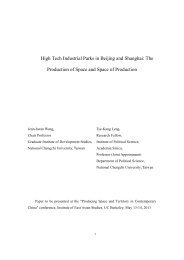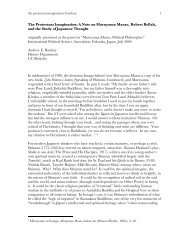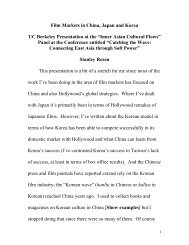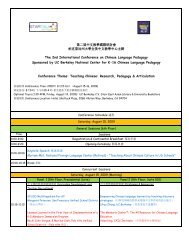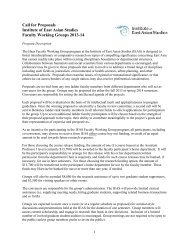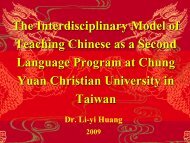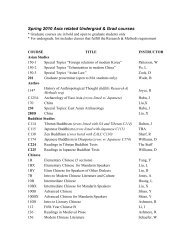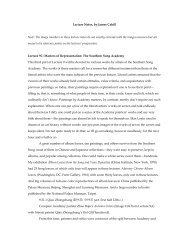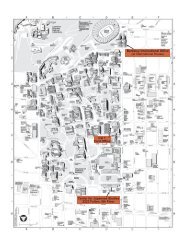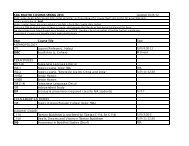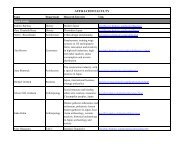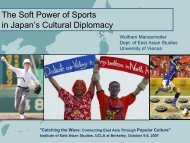Third Edition Spring 2013 - Institute of East Asian Studies, UC ...
Third Edition Spring 2013 - Institute of East Asian Studies, UC ...
Third Edition Spring 2013 - Institute of East Asian Studies, UC ...
You also want an ePaper? Increase the reach of your titles
YUMPU automatically turns print PDFs into web optimized ePapers that Google loves.
a cohesive nation. It should come as no surprise that, despite theBuddhist ideal <strong>of</strong> detachment, Sri Lankan Buddhism has found itselfburied deeply within the secular concerns <strong>of</strong> the world. Nowhereis this more evident than in the great land holding monasteries <strong>of</strong>Sri Lanka, which at times behaved more like noble landlords thana community <strong>of</strong> ascetics. Michael Carrithers, in the 1984 book TheWorld <strong>of</strong> Buddhism, in a section appropriately titled “They will beLords upon the Island,” details the extensive connection betweenthe Sri Lankan sangha and their roles as landlords. According toCarrithers, “…it was the Sangha’s involvement with productive agriculturewhich set the seal on the monk’s entanglement as landlordsin Sinhalese society.” 1 The monasteries could order irrigationtrenches to be dug, withhold water from people who missed rentpayments, and generally behave as a conventional noble who hadbeen granted land by the king. But the power <strong>of</strong> the monasteriesto control the lives <strong>of</strong> the peasants did not wane with the end <strong>of</strong>the growing season. As Carrithers states, “the real strength <strong>of</strong> thisvast edifice <strong>of</strong> landholding is revealed in its…possession <strong>of</strong> legalpower.” Evidence found in Sri Lanka “…sometimes also includedclauses implying that monastery functionaries were responsiblefor the administration <strong>of</strong> justice as well, if not for capital punishment.”2 The Sri Lankan Buddhist sanghas that had control over thelife and death <strong>of</strong> their attendant followers can certainly be said tohave been endowed with great secular power.Thus, the holding <strong>of</strong> land was a practical expression <strong>of</strong> the Sri Lankansangha’s power, while the sangha acted as the guardians <strong>of</strong> SriLanka morality and law. Carrithers writes:In other words, over the political realm, the monks reign both as exemplarsand as preachers. The precedence awarded the Sangha betokensthe precedence <strong>of</strong> their moral principles, so that the king rules by theGood Law…and under his moral sovereignty, backed by the sangha’smoral sovereignty, Sri Lanka is the Island <strong>of</strong> the Good Law… 3In other words, without the sangha the king has no moralauthority to govern. Without a sangha to bestow legitimacy on1 Carrithers p. 1152 Carrithers p. 1163 Carrithers p. 118everything from coronation rituals to merit-making opportunities,wherein the entire kingdom <strong>of</strong> Sri Lanka was symbolically givenover to the sangha (and then promptly returned), 4 the king’s claimto rule was baseless. This relationship, however, is not to be understoodas one sided, as the king had the responsibility <strong>of</strong> protectingthe sangha and keeping it cleansed. “Much <strong>of</strong> later Sri Lankan historyconcerns the efforts <strong>of</strong> kings to keep the sangha ‘pure’ and welldisciplined…and even the prosperity <strong>of</strong> the nation depended on itsmorality.” 5 The takeaway from this is that one <strong>of</strong> the ways to characterizethe Theravada tradition in Sri Lanka is by its close sangha/state connection, to the extent that both were mutually dependenton the other, even while jostling for the position <strong>of</strong> primacy.The Sri Lankan sangha is still firmly entrenched as a majorpower group within Sinhalese society and government. “The secularengagement <strong>of</strong> the Sri Lankan sangha with the state is seenin monks in modern times moving towards political engagement,even so far as to guide their parishioners politically.” 6The tradition <strong>of</strong> strong state/sangha connection is alive notonly in Sri Lanka but in Thailand as well. “A distinctive feature <strong>of</strong>traditional Buddhism in Thailand…is the organization <strong>of</strong> the Sanghaas a national institution virtually under state control.” 7 As in SriLanka, the modern nation <strong>of</strong> Thailand continues to have a strongconnection between the Buddhist sangha and the state. This particularmodern relationship had its beginnings in the 19th centurywhen a king undertook a cleansing and reorganization <strong>of</strong> the sangha.“After that, state and religion in Thailand became even moreclosely associated than before, and attempts have been made tojustify government policy by Buddhist principle.” 8 The sangha in SriLanka and Thailand, both in the distant past and in modern times,not only served their society’s religious needs, but more concretesecular needs such as supporting a particular political ideology.4 Carrithers p. 1185 Carrithers p. 1106 Carrithers p. 1227 Bunnag p. 1888 Bunnag p. 18789 Robert Bowers Curl Laicization in Japanese Buddhism 90



